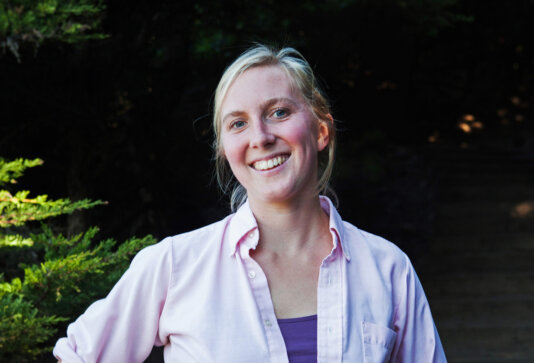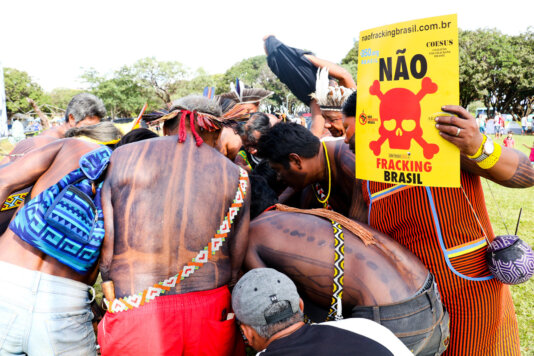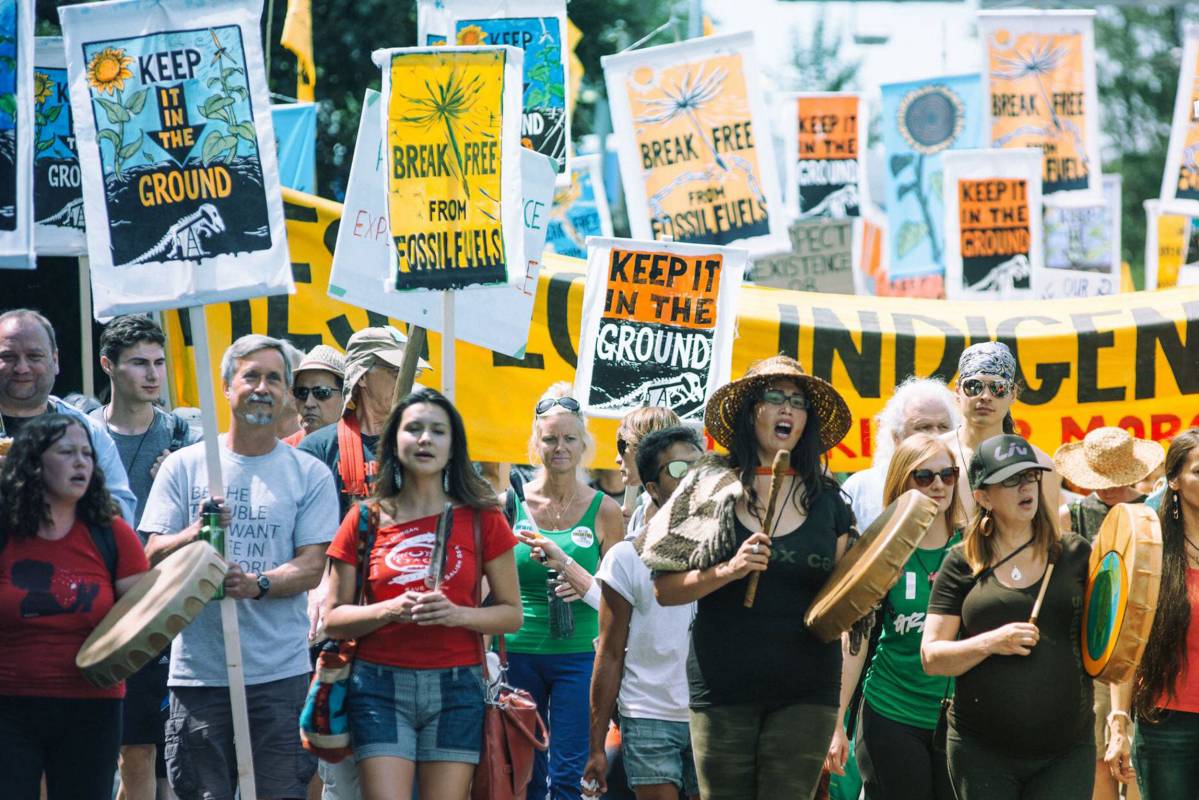- About
- Topics
- Picks
- Audio
- Story
- In-Depth
- Opinion
- News
- Donate
- Signup for our newsletterOur Editors' Best Picks.Send
Read, Debate: Engage.
| October 22, 2021 | |
|---|---|
| topic: | Climate action |
| tags: | #350.org, #COP26, #climate crisis, #climate action |
| partner: | The Beam |
| located: | USA, China |
| by: | Frank Odenthal |
Bill McKibben, Right Livelihood Award winning activist and founder of 350.org, has recently stepped down as CEO; but his successor is just as motivated to fight climate change and to keep fossil fuels in the ground. FairPlanet had a word with May Boeve, 350.org‘s new CEO.
FairPlanet: The Keep it in the ground movement was initiated by 350.org. Tell us about the origins of this project.
May Boeve: As with so many good ideas, it started with activists on the ground, who were living near a coal mine or a fracking site. So the action came out of the climate justice movement. I guess we started hearing about this idea from indigenous peoples' organisations, many of whom are experiencing historical levels of extraction on their lands ...] And we really believed that the climate movement so desperately needs a clear demand that everybody can understand.
That‘s partly why I think Keep it in the ground as a concept has become so popular. Because [...] climate science is a little complicated. You read one article that says stop eating meat, and you read another article that says change your light bulbs, and it doesn‘t quite convey the scale of the problem. Keep it in the ground is a way of understanding the most significant thing that needs to happen, that will have the most impact on fighting climate change, and that is stopping fossil fuels.
Our particular focus has been on finding activists all over the world who are engaged in these fights and trying to keep [fossil fuel] in the ground where they live, and bringing them together, so that they can be a powerful voice for change. Once they have a particular fight against a coal plant or against something like the Keystone XL pipeline or the Lamu coal plant in Kenya, or any number of other iconic projects, once there‘s a win like that in any part of the world, you can make the case that there is momentum everywhere.
A lot of people compare the fossil fuel industry to big tobacco as an industry that continuously lies about a product that is corely harmful. But you can just stop smoking and you can just stop selling cigarettes, and that‘s the end of the problem. But with climate change, you can be smoking anywhere or stop it - and the problem continues. That‘s why having an interconnected global movement is so important.
When did you start campaigning for Keep it in the ground?
Our first effort on Keep it in the ground was in 2011 - the fight over the Keystone XL pipeline. I would say the message started to be known in the early 2000's. But I think we got involved 2011.
The divestiture movement was inspired by South African apartheid divestment. We felt that the climate movement needed to pick a battle that was sort of like a David and Goliath sort of fight. And in order to do that, you have to pick sides. And divestment forces you to take a side, because if you are, for example, a charitable foundation giving grants to communities that are planting community gardens, but your endowment is invested in a thing that‘s causing the problem, you have not really chosen a side.
So, by putting that divestment demand in front and center, it forced a lot of institutions to really reckon with how serious are we about fighting the climate crisis. What are we willing to do? Are we willing to put our money where our mouth is, so to speak?
Could you explain that concept in more detail?
The concept is simple. It‘s essentially that it is wrong to cause climate change; it is wrong to profit from climate change. So, the effort is to get investors, banks, insurers and anyone who is in the financial sector to get out of investing in what is harmful, and specifically getting out of investing in coal, oil and gas. And to re-invest that money into solutions to the climate crisis. Into de-centralised comunity-ownd renewable energy, which is a critical part of the solution.
As of today - I just got the up-to-date numbers - today there have been $14.6 trillion in assets under management divested. Not bad for a campaign that started just a few years ago really.
Looking back, what have been the biggest success stories of the movement?
The very first city to divest in the US was the city of Seattle, WA. And that really helped, because it shows that an entire city‘s holdings could make a powerful decision like this. The Rockefeller family divested as well. Technically it was the Rockefeller's brother‘s fund, which is one of John D. Rockefeller‘s many foundation of his descendants. He made his entire fortune in oil. To say: "no more, this is wrong" is a very powerful sign. And in campaigning symbols like that are incredibly important, because they show what‘s possible.
Most recently, Harvard University just divested, and that‘s important not only because of the size of their portfolio, but also because of how influential Harvard is in the world. Think of the amount of people who run other institutions that have some affiliation with Harvard. And I‘ve even heard anecdotally that other organisations that where on the fence of divesting did it once they saw that Harvard did it. And that just happened a couple of weeks ago.
There have been very large wins; like the New York State pension fund divested its $220 billion, which in terms of value of money was an enormous commitment.
And there are tiny colleges and school boards and very grassroots level decisions, and that‘s really what fuels the movement. Each time you get a big win, like Harvard, it gives momentum for all those other fights that are trying to succeed.
Are you trying to get religious leaders on board as well?
Some of the most notable faith institutions have divested, like the Church of England, and that sent a big ripple affect. We want to look at all the commitments. There‘s been a big focus on religious institutions, universities, cities. And then from there, we‘re really looking at the financial sector as a whole, from comercial banks like Chase Bank to central banks like The European Central Bank or the Federal Reserve in the US. We‘re now starting to work at that level.
And the regulators of the entire financial system, they understand that their actions have a tremendous role to play in how quickly we tackle climate change. They are open-minded. I think what‘s changed in the climate fight is that most entities feel like they have to say something about climate change. They have to have some position, some action taken. And that‘s really the success of the movement.
It‘s now that there‘s a demand that you have a position, that you have taken a stance. And our work now is to make sure that that stance is significant enough to really matter. Because we‘re in a countdown of how quickly we‘re actually able to reduce emissions.
For a central bank just to disclose all the activities that are related to fossil fuels doesn‘t really help us. We‘re at this kind of eleventh hour in the climate fight, we need everyone to use every tool available. But while the central banks are listening and willing to talk, they‘re not acting as swiftly as they should. That‘s why we‘ve been trying to raise the pressure on them.
In the past you were trying hard to get the Gates Foundation on board. Did you succeed?
Bill Gates is a good example. He knows he has to do something about climate change, at his foundation and personally. But his particular approach is very much about 'they‘re all technology'. And that makes sense given who he is and what he spends his life working on. But he has been quite critical about the divestiture movement. And that has not really changed. And I think his view of what is going to make the climate change problem fixed is he believes that with the right information, the right technology we‘re gonna confront this problem, whereas we at 350.org fundamentally understand climate change as a power problem: who has it, who doesn‘t have it, and who‘s making the decisions?
The COP26 is coming up in Glasgow at the end of the month. What are your expectations?
There‘s an incredible amount of pressure on negotiators to deliver something that lives up to what‘s in the Paris Agreement. And we know that this pressure is unlikely to be met.
Part of what‘s been a sticking point is that developing countries are expecting financial support that was promised in Paris in 2015 and hasn‘t ever materialised. So, in terms of actually having a negotiation where everyone is in agreement and everyone is working together, that pressure has to be met.
A couple of weeks ago, the Biden administration promised additional climate financing, which hopefully will mean that other countries will do the same. If that happens, the possibility of a significant outcome at Glasgow becomes possible. That‘s important context.
It was also citical that the president of China, Xi, announced an end to overseas financing of new coal plants around the world. China has really been driving a lot of that investment as part of their foreign policy strategy. So, if China isn‘t investing in coal plants overseas, many other countries will do the same, and it might have a ripple affect with other investors as well.
So those two announcements, both the financing and the coal announcement, can ascramble the politics a little bit in a good way, which means that it‘s possible that something unique and significant can come out of Glasgow.
It‘s really all about the level of ambition. Our country is willing to do more than they said they would, and they are willing essentially to make some sacrifices to do that. That‘s what we pay attention to, but at the same time we have to watch out for a lot of greenwashing. Because everyone wants to get some positive news about what they‘re doing, and to do that there‘s a lot of false commitments. That‘s also something that we need to be cautious about going into these big summits.
You‘re still optimistic, tough, right?
Yes, I‘m always optimistic. I think you have to be if you going to work on the climate problem, because the odds are not good. There is going to be a lot of pressure coming from the streets for negotiators to deliver something. We have seen time and time again that it actually has a positive impact on what is agreed at a given summit.
May Boeve is an American environmental activist and the executive director of 350.org. She helped launch 350.org along with six other undergraduates and environmentalist author Bill McKibben while she was finishing her undergraduate degree at Middlebury in 2007.
Image by: Luis Chumbe
By copying the embed code below, you agree to adhere to our republishing guidelines.



